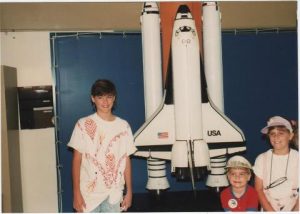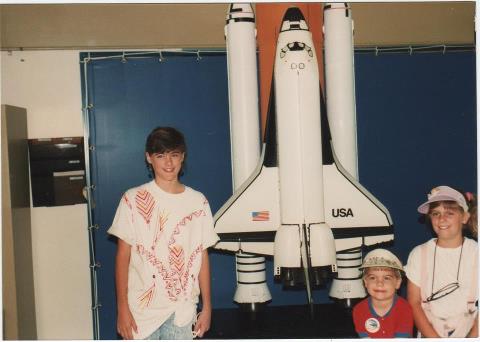306 – November 2
“There is no death—only a change of worlds.”—Native American Proverb
I remember well, that horrifying day years ago, when the space shuttle Challenger exploded into space. My father had worked in the space program nearly all his life, and helped design the navigational system for the shuttle. On many mornings, my sisters and I had gotten up in the early dark before dawn to watch another space launch: The Mercury program, Gemini, Apollo, and all the shuttles. Star Trek fans, we cheered when the first space shuttle was named the Enterprise.
We girls had grown up and moved out, but we still watched dad’s space ships take off. He had been working on the Challenger launch for three days in a row, but was off duty on that fateful day when the weather froze and the O-rings failed. I called him immediately, crying on the phone. He was aghast, the worst fears of all having been realized. We shook our heads, and prayed for the adventurous souls who had been lost, and the families they left behind.
As I drove along the ocean on my way to my office, Barbra Streisand’s version of Somewhere from West Side Story played on the radio. I thought about the teacher, Christa MacAuliffe, who had perished in the explosion. I had seen her on television, and the competition for the title “First Teacher in Space.” I saw the moment when she was announced the winner and saw her joy and happiness over having been selected. She was fun, she was funny, she was a dedicated teacher. None of us knew then that winning this prize meant her death.
I thought, too, about the woman who came in second in the running for this prize. How disappointed she must have been on that day when the winner was announced and it wasn’t her. She had lost the prize—but it meant that she lived.
Think about this when you cry over your next loss: What looks like good news isn’t always good news and what looks like bad news isn’t always bad news. There are plans and purposes to life beyond our knowledge. As Richard Bach stated in his book, Illusions, everything in life boils down to two things: Fun and learning. If you’re not having fun, you’re learning something. And when your mission has been accomplished, you leave the planet.
Mission accomplished, Christa, Dick, Michael, Ronald, Ellison, Gregory, and Judith. We remember and honor you.
Today’s Affirmation:
“I thank God for my time upon this rich Earth!”

How big is the dream you have? Who’s to say it’s impossible?
For most of recorded history, people had lists of things that were impossible—flight, space flight, talking long distance, seeing long distance, replacing limbs or organs. Bit by bit and byte by byte, we’ve done all of these things. Nothing seems impossible any more—we just acknowledge that we haven’t invented the technology yet.
My dad was an aerospace engineer, and I grew up watching all the rocket liftoffs at 5:00 am with the family. I loved reading his science fiction magazines and novels, which spoke of space flight to other worlds, robots to do our bidding, new technological inventions like virtual reality or hand-held computers.
Science fiction authors invented many things in common use today: Lunar exploration was mentioned as early as 1634 by Johann Kepler. Jules Verne foresaw scuba diving in 1870, Edward Ballamy wrote about credit cards in 1888, and H.G. Wells described a flat surface with moving pictures in 1899, which we now know as a tablet computer. In 1932 genetic engineering was introduced by Aldous Huxley, satellites were mentioned by Isaac Asimov in 1945, and Mark Twain wrote about a global communication device like the internet in 1904.
I remember watching Star Trek and all the kids thought how cool it was that they had “communicators” which they could flip open and talk with each other. Now, cell phones are everyday reality. They had to take out the House of Tomorrow at Disneyland when everything in it became widely used in everyday life. Science fiction becomes science fact on a regular basis. If you can believe it, you can achieve it.
There weren’t very many good science fiction films when I was growing up—Forbidden Planet was the best of the lot. There was only one woman in the entire movie, which was fairly typical of the genre. Although it was still largely a male universe, sci fi films radically improved in the 70s, with the advent of Star Wars.
I saw it on opening day at the Chinese Theater in Hollywood with my dear actress friend, Gaye Kruger, and an actor friend of hers named Ty. I’ll never forget it. When the space ships flew overhead in the very beginning of the movie, the audience roared and cheered, and continued clapping for the entire opening battle sequence. We were electrified by the story, the special effects, everything. It was a wonderful group experience, the audience was enthralled as one being, and gave the film a standing ovation. (There is an energy to watching a movie as a group that is entirely missing from watching a movie alone. Don’t you feel that?)
After the movie, the three of us went back to Gaye’s apartment where we called Mark Hamill, who played the young hero, Luke Skywalker. Gaye knew him from a film project and I had met him before on several commercial auditions. When I grabbed the phone, I just raved about the movie and his part in it. I remember he was so tickled we liked it and kept saying, “Really? You really liked it? I’m so glad!”
Of course, this was way before it took off – no one knew that this little film was going to be a huge juggernaut and the highest grossing film of all time for many years. It also started a wave of science and speculative fiction movies and television I’ve enjoyed ever since. – Excerpt from “From Worry to Wealthy” by Chellie Campbell


